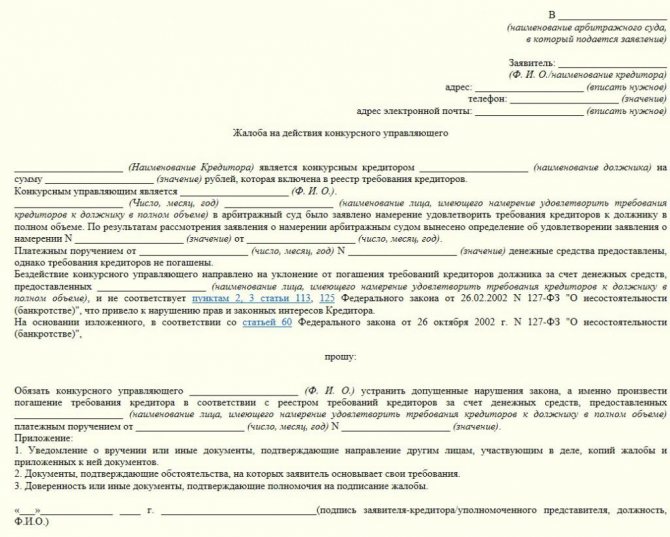Bankruptcy litigation is a complex undertaking, during which the bankruptcy trustee plays a prominent role. The interests of all participants in the procedure are not always respected, therefore each representative of the case has the right to appeal an infringing action or decision. But in order to obtain a positive decision, it is important to strictly follow the procedure in which a complaint against the bankruptcy trustee is filed with the arbitration court and what requirements are imposed on the content of this document.
Rules for appointing a manager
This specialist is appointed only by the court in which a specific case is being conducted to declare a citizen or company insolvent. The manager must be a member of a self-regulatory organization of insolvency practitioners. For his work he receives a certain remuneration, which is taken from the debtor’s funds.
The specialist has numerous powers that allow him to fully support the procedure for declaring a debtor bankrupt. He may not coordinate his actions with defaulters or creditors. But if in the process of work he violates the requirements of the law or he fails to cope with his duties, then creditors may file a complaint against the actions of the arbitration manager to various authorities.
How to properly file a complaint
When drawing up a complaint against an arbitration officer, it is necessary to take into account many important nuances: from the structure of the document itself to the correctly formulated wording of violations. When providing services, our company uses methodological recommendations that are necessary for correctly drawing up a complaint against the actions of a manager from an arbitration organization. This approach allows us to receive a consistently high percentage (more than 90%) of satisfied complaints.
What you need to know when filing a complaint:
- the document consists of an address part, which is highlighted, a motivational and operative part;
- the motivational part is provided to indicate a list of unlawful actions of the arbitration manager (documented);
- the operative part is intended to indicate actions that are within the competence of a particular organization.
For example, if you decide to send your complaint to the arbitration court, the purpose of this action is to request recognition of specific actions of the defendant as inconsistent with certain articles of the Insolvency (Bankruptcy) Law.
Which bodies accept complaints about the illegal actions of the arbitration manager?
Arbitration court
First of all, you can complain about the illegal actions of the arbitration manager to the arbitration court, which, in fact, is the main body that considers such cases. Carrying out control functions, the arbitration court makes decisions on the appointment and removal of insolvency practitioners. The complaint sent to this authority must be filed by a person who is participating in the bankruptcy case. In addition, the document must comply with the rules established by arbitration procedural legislation.
Practice shows that a filed complaint can be rejected, since arbitration managers are participants in the bankruptcy market who have arbitration practice and engage lawyers who also specialize in this matter for their activities. Therefore, when filing a complaint against the activities of an arbitration manager, the help of a professional becomes one of the key factors that can significantly increase the success of your case.
Federal service bodies
In addition to the arbitration court, which has all the necessary powers, the following are also involved in holding arbitration managers accountable: the federal state service. register, cartography and cadastre. If a complaint is filed with the above authorities, the manager may be held accountable in court by the authorities of the Russian Register. The Ros.Reestr organization is the body that supervises and maintains the relevant registers. More detailed information about activities can be found on the official website https://www.rosreestr.ru/. On the pages of this resource you can familiarize yourself with the register of organizations of arbitration managers, including the register of arbitration managers.
However, it is worth noting that the decision to send a complaint to the central office of a given organization is not always correct. It is noted that most often such actions only lead to an increase in the period for its consideration. The best option, in which the results will not be long in coming, would be to send a complaint to the territorial office, since the bodies of the Russian Register more often accept complaints that are filed on behalf of the meeting of creditors and government agencies. Other cases of complaints are forwarded to the SRO for more detailed consideration.
Organizations of arbitration managers (self-regulatory)
The competence of the SRO, or self-regulatory body of insolvency practitioners, includes mandatory control of the professional activities of the specialists included in its composition. The organization is also obliged to monitor managers regarding compliance with the Laws of the Russian Federation on bankruptcy, and other federal standards and legal acts, as well as rules and standards that are related to professional activities.
The SRO organization is obliged to consider complaints received as a result of the activities of its employees, and for this there is a special body - the disciplinary committee. Before drawing up and sending a complaint to the SRO, you must familiarize yourself with the statutory and regulatory documents of this organization. Or, as a simpler and more effective way to achieve the desired result, use the services of a professional lawyer.
I also recommend reading this article
The law on collectors worked negatively
Borrowers have begun to complain more often about collection agencies. Experts predict an increase in the activity of collectors who want to make the most of their powers while it is possible. Chelfin.ru looked into what made the collectors work at full capacity and what could stop them.
Continue reading
FTS, or Federal Tax Service
The organization of the Federal Tax Service, or the Federal Tax Service, is a government body that is empowered to consider bankruptcy cases, and in particular, to consider complaints about unlawful actions of arbitration managers participating in bankruptcy proceedings. In addition, the Federal Tax Service is also a registration authority that takes part in the fight against raider takeovers, which are often carried out through forgery of documents indicating a change of legal address or gene. Directors of the organization.
It is advisable to file a complaint against the arbitration manager with the Federal Tax Service only in cases where harm is caused to the interests of the creditor(s), or the state. In addition, this authority also accepts complaints if there is a fact of seizure of an enterprise.
In practice, there are a huge number of examples where filing a complaint with the Federal Tax Service was effective. For example, a small company located in Siberia, after submitting a reasoned complaint to the Central Office of the Federal Tax Service, drawn up in accordance with all the rules, managed to initiate the issue of removing the manager from his duties. However, in order to achieve the expected result, you should clearly understand what rules the tax service is guided by, as well as familiarize yourself with the internal documents and norms it uses in its work.
Other competent authorities
In addition to the above bodies authorized to consider complaints against the actions of the arbitration manager, there are also other services that are also capable of resolving the problem related to the bankruptcy case. In particular, these include: internal affairs bodies, prosecutors, the Ministry of Finance of Russia, etc. When filing a complaint for consideration by these authorities, it is recommended to send the relevant documents to the address. Only if your question is within the competence of one or another organization will the complaint be considered. An example is a situation where a complaint is sent to a department of the Presidential Administration. Naturally, the President of the Russian Federation will not personally consider your application, and the received documents will be forwarded to the authority authorized to deal with such issues. As a result, you will have to wait more than one month for an answer.
Reasons for filing an appeal
Creditors should understand what complaints there may be against the insolvency practitioner. They depend on the reason for which the appeal is being made. Most often, when drawing up a complaint, the following unlawful actions on the part of the manager are indicated:
- the debtor's property is accepted in violation of the law, as well as without first conducting an inventory;
- an appraiser who does not have the necessary license to carry out this activity is hired to determine the value of valuables;
- employees of the liquidated company are not notified in a timely manner about the termination of their employment relationship with the company, since notifications must be sent a month before the planned start of bankruptcy proceedings;
- the specialist did not carry out any measures the main purpose of which was to ensure the safety of the debtor’s property;
- serious mistakes were made when studying the financial condition of a person or company;
- does not want to take into account various comments and demands made by the meeting of creditors;
- when presenting claims, the debtor violates legal requirements;
- the register of creditors' claims contains numerous violations and errors;
- the manager does not want to search for property owned by the debtor.
Creditors who wish to file a complaint against the insolvency administrator must first make sure that they have truly compelling and significant grounds for this. Only in this case can you count on a positive response to the claim.
Rights and obligations of bankruptcy trustees
The rights and obligations of a specialist appointed to conduct bankruptcy proceedings are regulated by the provisions of Article 129 of Federal Law No. 127 “On Insolvency (Bankruptcy).
From the moment of appointment of this specialist and until the end of his term of office, the bankruptcy trustee acts as the owner of the debtor’s property. This means that any actions with property (sale, lease, donation) must be agreed upon with the bankruptcy trustee. In the case of individual entrepreneurs and legal entities, the specialist also acts as the head of the company.
The rights of the bankruptcy trustee include:
- disposal of the debtor's property on the basis of current legislation;
- dismissal of employees and management of the company in the manner prescribed by law;
- challenging transactions related to property made over the last three years before filing a bankruptcy petition with the court;
- refusal to fulfill the terms of contracts or other transactions, guided by Article 102 of Federal Law No. 127.
The list of responsibilities of the bankruptcy trustee includes:

- inventory of the debtor's property and ordering its assessment;
- seizure of property in accordance with the procedure established by law and ensuring its safety;
- notifying employees and company management about dismissal in advance (notification periods are specified in the Labor Code);
- notifying creditors of the debtor's bankruptcy, compiling a register of creditors and holding their meeting;
- organization of auctions at which the debtor’s property will be sold;
In addition, Article 129 of the Law “On Bankruptcy” grants the right to a meeting of creditors to make a decision regarding the termination of the economic activities of an individual entrepreneur or legal entity (with the exception of some cases specified in the article). If the appointed specialist refuses to accept the decision of the meeting of creditors, a complaint is filed against the inaction of the bankruptcy trustee, a sample of which can be found on the Internet or from professional lawyers.
It is also necessary to file a complaint if a specialist abuses his powers or does not fulfill his duties.
Where to file a complaint?
When drawing up a claim regarding the work of an arbitration manager, you can select several organizations to send this document. You can appeal the actions of a specialist in the following structures:
- arbitration court in which the bankruptcy case of a specific debtor is heard;
- a self-regulatory organization of arbitration managers, of which the specialist is a member;
- Rosreestr;
- tax service.
It is the above government organizations that can influence the work of the manager. If the court confirms that his actions are illegal, then he is removed from office without receiving payment for actions already performed. When drawing up a complaint, it is recommended to leave references to various regulations or even cases from judicial practice.

Complaint against the actions of the bankruptcy trustee
The structure of the complaint must have the following parts:
- Address. The essence of this part is to describe the name, details of the addressee and addressee.
- Motivational. Contains a description of the manager’s unlawful actions with reference to legal norms, as well as the evidence base.
- Resolution or final part. Contains a description of legal norms that reveal issues within the competence of government bodies, which is the basis for contacting a particular body.
You can appeal the actions of this authorized person to the arbitration court, tax authorities, self-regulatory organizations and ROSREST.
Complaint Procedure
A complaint against the bankruptcy trustee is filed in the following sequence of actions:
- the optimal text of the document is initially prepared, and it is usually drawn up directly at a meeting of creditors by all interested parties;
- the claim is sent to authorized organizations in a suitable way, for which it can be brought in person, sent electronically, or even using postal mail or the help of a representative;
- the application is considered within the established time frame, and the deadline for this process is 30 days;
- based on the results of consideration of this application, a ruling is made by a court or other organization;
- if the information in the claim is justified, then it is satisfied, so a new manager is appointed;
- The parties to the proceedings have the right in the future to demand compensation through the court for damages caused by the previous manager.
Most often, the preparer is the lender. But there are situations when legal requirements are violated in the process of confiscation and sale of the debtor’s property. In this case, the direct debtor can file a complaint against the arbitration manager.

Methods for submitting a claim
The method for transmitting a complaint depends on where the complaint is sent. To do this, you can choose the following options:
- a personal visit to a specific organization, after which the application is handed over to an employee of the institution;
- sending a document by mail;
- the use of an electronic appeal, which can be compiled on the website of almost any regulatory government organization;
- sending a document by email;
- using a courier service;
- transfer of the document through a representative.
In any case, the application must be drawn up in two copies. One document is handed over to an employee of a specific government agency, and the second is marked with acceptance.

Compilation rules
To formulate an appeal to the bankruptcy trustee, certain requirements are taken into account. The entire text is divided into three parts:
- Introductory. This indicates where the claim is being sent, as well as information about the complainant. The number of the case on declaring the debtor insolvent is written down.
- Descriptive. It contains the essence of the claim, and therefore lists all the information about which actions of the bankruptcy trustee do not comply with the requirements of the law. It is advisable to leave links to regulations, and also describe the consequences of the specialist’s illegal actions.
- Resolute. All the applicant’s requirements that do not contradict the law are listed here. Usually they are represented by the removal of the manager from his work, as well as holding him accountable.
Not only direct creditors or debtors, but also their representatives can file a complaint. All information must be confirmed by official documents, therefore other papers or materials represented by various receipts, decisions, contracts, resolutions, reports or other documents are attached to the complaint.

Who can participate in a bankruptcy case?
How to file a complaint against an appeal ruling?
Where can I complain about the inaction of the prosecutor's office?
How to complain about Uber?
How to write a statement to the prosecutor's office against an employer about non-payment of wages?
Where can I complain about late wages?
How to file a complaint with the Central Bank?
In order to defend their legitimate rights and interests, arbitration creditors can apply to the appropriate court with a complaint about the unlawful actions of the bankruptcy trustee.
INFO! All rights of creditors are presented in Article 60 of the Federal Law “On Bankruptcy” (parts 1,2,3).
Thus, the right to file a complaint against the actions of the bankruptcy trustee has:
- bankruptcy creditors;
- persons against whom an act of infliction of moral harm to health must be issued;
- a person officially representing the interests of the property owner;
- a person who officially represents the interests of employees.
In accordance with Part 4 of Article 60 of the Bankruptcy Law, complaints filed by persons not participating in the bankruptcy case will not be considered.
When is a complaint not considered?
When filing a complaint against an arbitration manager, some requirements and rules may be violated. This results in the claim not being accepted for consideration. This is usually due to the following reasons:
- there is no information about the applicant, and anonymous complaints are never considered;
- information is entered by hand, but the handwriting is illegible, so it is not possible to understand what is written in the application;
- in the text the applicant wishes to appeal the court decision;
- a question is asked that has already been answered;
- the answer requires disclosing state secrets or other confidential information.
Complaints to the SRO or other authorities that contain insults or obscene language are ignored.

Review period
Typically, complaints against an arbitration manager are reviewed within 10 days, but by law the process can take up to 30 days.
The response is sent to the applicant in the manner specified in the text of the appeal. To do this, a letter can be sent to the address of the request. Responses are often given electronically, for which they are sent to the applicant’s email.










